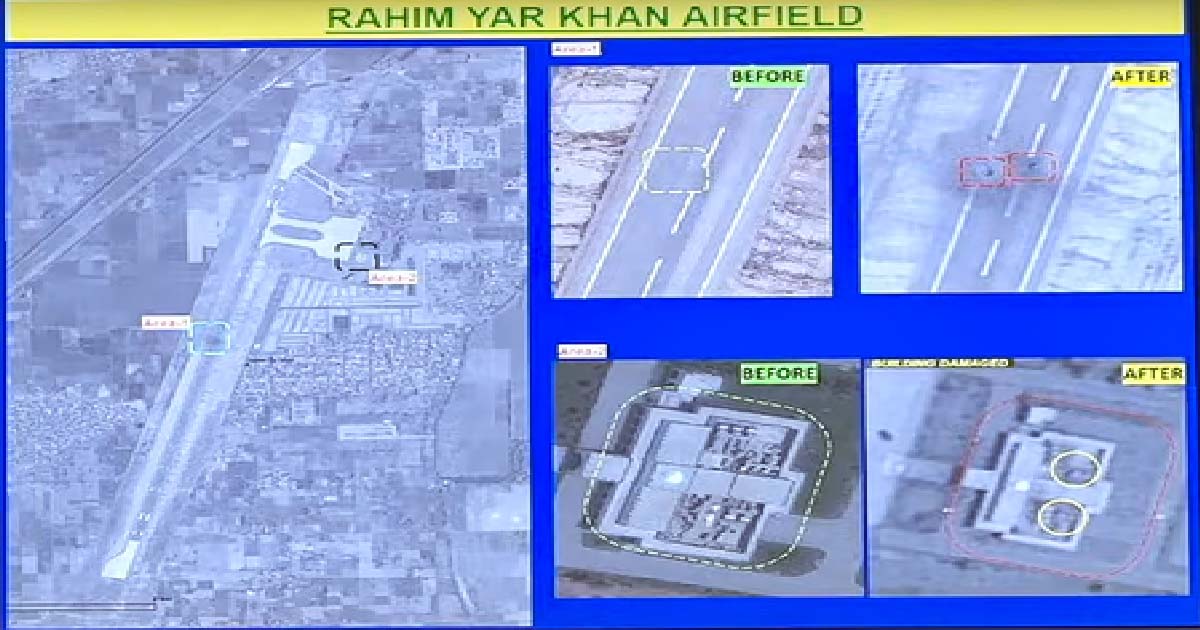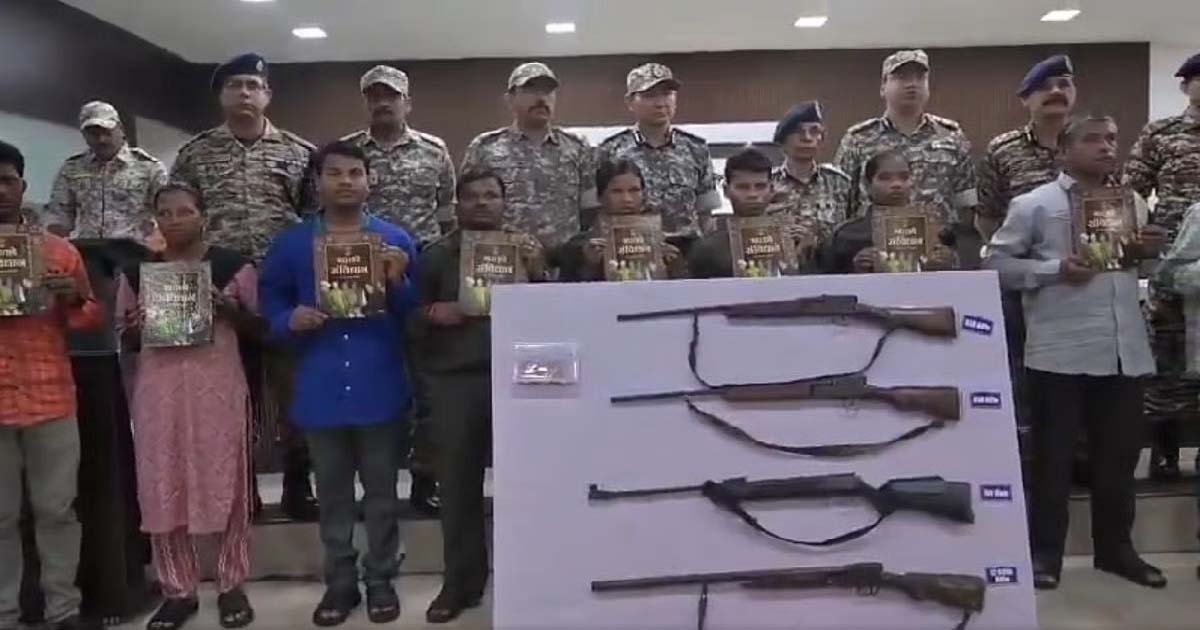National News
Surviving India’s wrath: Tough road ahead for Pakistan

New Delhi, May 12: The half-burnt portrait of Asif Ali Zardari from the smouldering debris of Rahimyar Khan air base is a symbolic devastation of the image of Pakistan as Operation Sindoor marked a significant demonstration of India’s military and strategic prowess through a blend of military and non-military means.
The extent of Pakistan being punished through both means is now quite clear.
The multi-dimensional operation successfully neutralized terrorist threats, deterred Pakistani aggression, and reinforced India’s zero-tolerance policy toward terrorism, all while maintaining strategic restraint and international support.
As far as the military measures are concerned, India employed a range of precise and deliberate military actions to achieve its objectives.
The Indian Armed Forces carried out coordinated precision missile strikes on nine terrorist facilities—four in Pakistan (including Bahawalpur and Muridke) and five in Pakistan-occupied Kashmir (such as Muzaffarabad and Kotli). These facilities were key command centers for Jaish-e-Mohammed (JeM) and Lashkar-e-Taiba (LeT), responsible for attacks like Pulwama (2019) and Mumbai (2008).
In response to Pakistan’s retaliatory drone and missile attacks from May 7-9 that targetted multiple Indian cities and military installations, India launched kamikaze drones to destroy Pakistani air defences across the country, including neutralising the air defence system of Lahore.
India’s air defence system proved instrumental in neutralising all incoming threats, resulting in near zero casualties or material losses, and exposing flaws in Pakistan’s HQ-9 system. The counter military actions on the night of May 9 and 10 also became the first instance of a country damaging air force camps of a nuclear country.
Within three hours, 11 bases were attacked including Nur Khan, Rafiqui, Murid, Sukkur, Sialkot, Pasrur, Chunian, Sargodha, Skardu, Bholari and Jacobabad.
The scale of destruction was clearly visible in the before and after photos of Shahbaz airbase at Jacobabad.
In the strikes, various ammunition depots and bases like Sargodha and Bholari that housed F-16s and JF-17 fighter jets were hit. This led to destruction of 20 per cent infrastructure of Pakistan’s air force.
India bombed Pakistan’s Bholari Air Base, killing over 50 people including Pakistan’s squadron leader Usman Yousuf, four airmen among others as well as destroying Pakistan’s fighter jets.
Over the course of Operation Sindoor, multiple terror and military locations across Pakistan were attacked by India. Along the LoC, following Pakistani artillery and mortar shelling in the Poonch-Rajouri sector that targetted civilian areas, Indian troops responded with calibrated counterfire destroying terrorist bunkers and Pakistani army’s positions to target civilians.
When it comes to the non-military measures, India’s non-kinetic efforts were equally significant in shaping the strategic environment and ensuring public and international support. India leveraged strategic policy decisions, information dominance, and psychological operations to isolate Pakistan economically and diplomatically, while bolstering domestic readiness and international support.
India’s suspension of the Indus Waters Treaty (IWT) under Operation Sindoor was a decisive move with far-reaching consequences. Pakistan, as the lower riparian, depends on the Indus system for 80 per cent of its 16 million hectares of farmland and 93 per cent of its total water use — sustaining 237 million people and driving a quarter of its GDP through crops like wheat, rice, and cotton.
With just 10 per cent live storage capacity (14.4 MAF) at Mangla and Tarbela dams, any disruption in flows threatens catastrophic agricultural losses, food shortages, water rationing in major cities, and rolling blackouts that would cripple industries, including textiles and fertilizers. These shocks could trigger a broader fiscal and foreign exchange crisis in an already fragile economy.
For India, the treaty had long constrained infrastructure development in Jammu and Kashmir, limiting it to run-of-the-river projects. Its suspension allows India full control over western rivers like Jhelum and Chenab — enabling new reservoirs, boosting irrigation and hydropower in Jammu and Kashmir, Ladakh, Punjab, and Haryana, and transforming a diplomatic tool into a developmental advantage.
By suspending this, India gave decisive message that water and blood cannot flow together.
India closed the Attari-Wagah border and suspended all bilateral trade with Pakistan, halting exports of key goods such as onions and restricting imports like cement and textiles. This decision severed the primary land-based trade route between the two countries.
The suspension imposed immediate economic costs on Pakistan, already grappling with inflation and debt. By choking off these economic lifelines without engaging in direct military escalation, India reinforced its zero-tolerance stance while avoiding full-scale conflict.
India also cancelled the visas of all Pakistanis living in India and sent them back in the immediate aftermath of the April 22 Pahalgam terrorist attack showing strong resolve against terrorism. The imposition of a complete ban on Pakistani artists, halting performances, screenings, music releases, and cultural collaborations also extended to streaming platforms, cutting off Pakistan’s cultural influence in India.
India exposed Pakistan’s terror ecosystem globally and isolated Pakistan diplomatically. These steps imposed tangible economic and diplomatic costs. Collectively, these actions deepened Pakistan’s isolation and reaffirmed India’s commitment to a zero-tolerance stance on terrorism.
Crime
Mumbai Airport Customs Seize ₹43 Crore Drugs, ₹1.51 Cr Gold & ₹87 Lakh Diamonds In 15 Smuggling Cases Over Past 8 Days

Mumbai, Dec 10: The Mumbai Airport Customs in 15 cases over the past eight days have seized smuggled drugs worth ₹43 crore, gold worth ₹1.51 crore and diamonds valued at ₹87 lakh.
According to the Customs, during December 03 till December 10 they detected ten cases of smuggling of hydroponic weed.
“Based on spot profiling, a total of 37.26 kg of suspected hydroponic weed valued at approximately ₹37.26 crore in the illicit market were recovered under seven cases from nine passengers who had arrived from Bangkok via various flights and were arrested under the provisions of the Narcotic Drugs and Psychotropic Substances (NDPS) Act,” said a Customs officer.
“The modus operandi used by the accused in these cases were that the passengers attempted to smuggle hydroponic weed by concealing the contraband inside the trolley bags and using the baggage tags of another flight to avoid detection by Customs Officers. In some cases, the passengers attempted to smuggle hydroponic weed by concealing the contraband inside the lumps of tamarind to avoid detection,” the officer said.
In three other cases, based on specific intelligence, a total of 6 kg of suspected hydroponic weed, valued at approximately ₹6 crore in the illicit market were recovered from three passengers who had arrived from Bangkok via various flights and were arrested under the provisions of the NDPS Act.
“Other than the NDPS cases, four gold smuggling cases were booked in which a total of 1,256 grams of gold valued at ₹1.51 crore were recovered and seized from four passengers. In one case, diamonds valued at ₹87.75 lakh were recovered and seized from one passenger,” the officer said.
National News
Major Blow To Naxal Network In Maharashtra: 11 Top CPI (Maoist) Leaders With A Cumulative Bounty Of ₹82 Lakh Surrender

Nagpur: In yet another success to the Maharashtra government’s campaign to end left-wing extremism, 11 CPI (Maoist) commanders and cadres carrying a cumulative bounty of ₹82 lakh surrendered before the Gadchiroli police on Wednesday morning in the presence of Director General of Police Rashmi Shukla.
The surrendered group includes several high-ranking leaders — Divisional Committee Members, Platoon Committee Members and Area Committee Members — marking one of the most significant mass surrenders in recent years. Security was tightened at the venue as four of the Maoists arrived armed and in full uniform.
Among those who surrendered were Ramesh alias Baju Lekami and Bhima alias Kiran Hidma Kowasi, both Divisional Committee Members of the banned outfit. Senior Platoon Committee members Poriya alias Lucky Adama Gota, Ratan alias Sanna Masu Oyam, and Kamala alias Rago Iriya Veladi also laid down arms. Others include Poriya alias Kumari Bhima Veladi, Ramji alias Mura Lachhu Pungati, Sonu Podiyam alias Ajay, Prakash alias Pandu Pungati, Sita alias Jaini Tonde Pallo, and Sainath Shankar Made.
Local officials believe the surrender has delivered a major blow to Maoist operations across the Dandakaranya region, spanning Chhattisgarh, Maharashtra and Telangana. The event was attended by Additional Director General (Special Actions) Dr Tshering Dorje, DIG Ankit Goyal, DIG (CRPF) Ajay Kumar Sharma and Superintendent of Police Neelotpal.
Wednesday’s surrender is being hailed as one of the biggest successes for Gadchiroli police since Bhupathi alias Mallojula Venugopal Rao, a Politburo member of the CPI (Maoist), surrendered before Chief Minister Devendra Fadnavis on October 15 along with 60 others.
“This is the beginning of the end of Naxalism in Gadchiroli. We are committed to the Union government’s deadline of March 31, 2026, to eliminate leftwing extremism from India,” DGP Rashmi Shukla said, adding that over 100 Maoists have surrendered in Gadchiroli district this year.
Business
BSE launches 4 new BSE 100 large-cap TMC universe factor indices

New Delhi, Dec 10: The Bombay Stock Exchange’s (BSE) subsidiary BSE Index Service on Wednesday announced the launch of four new factor Indices from the universe of BSE large-cap total market capitalisation (TMC) index with 5 per cent stock level capping.
The newly introduced indices are BSE large-cap 100 momentum 30, BSE large-cap 100 low volatility 30, BSE large-cap 100 enhanced value 30, and BSE large-cap 100 quality 30.
“BSE Index Services Pvt. Ltd., a wholly owned subsidiary of BSE, today announced the launch of 4 new BSE factor indices from the BSE 100 large cap TMC index as the universe with 5 per cent stock level capping,” the exchange said in a press release.
These Indices are Reconstituted Quarterly, have a base value of 1000, and the first value date is June 20, 2005, along with the additional screening for the liquidity profile, the release added.
BSE large-cap 100 Momentum 30 will track the performance of the 30 companies in the BSE 100 large-cap TMC that exhibit the most persistence in their relative performance, based on their momentum scores. Constituents are weighted based on their momentum score.
BSE large-cap 100 Low Volatility 30 will measure the performance of the 30 least volatile companies in the BSE 100 large-cap TMC. Constituents are weighted by their inverse volatility.
BSE large-cap 100 Enhanced Value 30 measures the performance of the 30 companies in the BSE 100 large-cap TMC with the most attractive valuations, based on their value scores. Constituents are weighted based on their value score.
BSE large-cap 100 Quality 30 measures the performance of the 30 companies in the BSE 100 large-cap TMC that exhibit the most persistence in their relative performance, based on their momentum scores. Constituents are weighted based on their momentum score.
“Building on the success of factor launches on the BSE 500 universe earlier in the year, we are pleased to expand our factor family with the launch of four new factor indices, this time on the large-cap universe,” BSE Index Services Pvt. Ltd MD & CEO Ashutosh Singh said.
“These indices, in the same vein as our BSE 500 universe factor family, will be reset on a quarterly basis with the introduction of an innovative score-based only weighting method,” he added.
The index said that these new indices can be used for running passive strategies such as ETFs and Index Funds.
It can also be used for benchmarking of PMS strategies, MF schemes and fund portfolios. Additionally, investors can now access a broader spectrum of market opportunities, further enriching their investment strategies with this latest addition to BSE’s suite of indices.
-

 Crime3 years ago
Crime3 years agoClass 10 student jumps to death in Jaipur
-

 Maharashtra1 year ago
Maharashtra1 year agoMumbai Local Train Update: Central Railway’s New Timetable Comes Into Effect; Check Full List Of Revised Timings & Stations
-

 Maharashtra1 year ago
Maharashtra1 year agoMumbai To Go Toll-Free Tonight! Maharashtra Govt Announces Complete Toll Waiver For Light Motor Vehicles At All 5 Entry Points Of City
-

 Maharashtra1 year ago
Maharashtra1 year agoFalse photo of Imtiaz Jaleel’s rally, exposing the fooling conspiracy
-

 National News1 year ago
National News1 year agoMinistry of Railways rolls out Special Drive 4.0 with focus on digitisation, cleanliness, inclusiveness and grievance redressal
-

 Maharashtra1 year ago
Maharashtra1 year agoMaharashtra Elections 2024: Mumbai Metro & BEST Services Extended Till Midnight On Voting Day
-

 National News1 year ago
National News1 year agoJ&K: 4 Jawans Killed, 28 Injured After Bus Carrying BSF Personnel For Poll Duty Falls Into Gorge In Budgam; Terrifying Visuals Surface
-

 Crime1 year ago
Crime1 year agoBaba Siddique Murder: Mumbai Police Unable To Get Lawrence Bishnoi Custody Due To Home Ministry Order, Says Report












